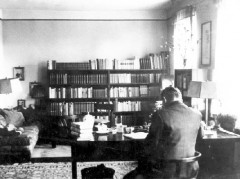09/03/2014
"Tales from the Underworld" review
A quite good review of Tales from the Underworld can be found under the following link :
http://1streading.wordpress.com/2014/02/16/tales-from-the-underworld/
or hereunder :
Michael Hofmann’s translation of Hans Fallada’sIron Gustavseems to have been delayed until later this year, but in the meantime we have this collection of Fallada’s shorter fiction,Tales from the Underworld. As Hofmann points out, these stories take us through Fallada’s writing career, beginning with his first published story, ‘The Wedding Ring’, from 1925, and ending with ‘The Old Flame’, published after his death in 1946. Also included are a few pieces which did not appear in print until the 1990s. (These are found at the end of the anthology which is ordered by publication but with reference to their probable dates of composition). Disappointingly, for those who know Fallada through his most famous work,Alone in Berlin, there is a gap between 1935 and 1945, and therefore nothing which touches on the subject of that great novel.
Above all, Fallada is interested in poverty and the struggle to earn a living: words like ‘revenue’, ‘pension’, ‘cheap’, ‘job’ and ‘fifty marks’ are scattered throughout the titles. One story is called simply ‘Food and Grub’. In the slightly gothic opener, ‘The Wedding Ring’, the ring may hold symbolic value to the husband, but to the other characters, the man who has found it and the wife, who offers fifty marks for its return, it is a commodity. ‘I Get a Job’ tells of the struggle not only to find, but to keep employment during the depression. The narrator finds work selling subscriptions to a newspaper on commission, a precarious income in itself. The job is lost on a customer’s whim, leaving him very much where he started:
“I had nine marks left. I would go to the city and try to find something there.”
In ‘Happiness and Woe’ the unemployed husband spends the rent money: “It was like an illness. I don’t know what came over me.” It is his wife’s matter-of-fact forgiveness, however, that makes the story surprising. ‘The Lucky Beggar’ is another story that explores the desperation of the hunt for work. This is not to say that all the stories are gloomy and depressing, but even the happiest, like ‘Fifty Marks and a Merry Christmas’ tend to be about making ends meet. In fact, the ‘happy ending’ in this story is literally represented by a balance sheet.
In all these stories relationships are important: rarely are Fallada’s characters loners facing their problems alone. Generally, and perhaps sentimentally, these relationships tend to survive poverty unscathed. In ‘The Returning Soldier’ the main character returns from the war with an injured arm that won’t bend. He tells his fiancée that they can no longer marry but “She was adamant that she didn’t want to let him go.” In the ensuing embrace, his arm begins to move again. Both the early story ‘Passion’ and the late story ‘The Old Flame’ (twenty years separating them) are about characters who cannot forget their first love.
While a number of the stories are well crafted, others are closer to sketches. Many have an autobiographical or documentary feel. When Fallada begins one with the line:
“There was once a young man – not to put too fine a point on it, it was I, the author of these lines…”
we feel that this could apply to a number of the stories. Others read as stories Fallada has been told, and are presented in unvarnished form as such. ‘Why Do You Wear a Cheap Watch?’ is literally an answer to that question; ‘On the Lam’ is the written down tale of someone Fallada met in prison. But it is this urgent realism that is often their main attraction. Few writers have described the lives of this in the ‘underworld’ as Fallada has, and this collection provides an excellent overview of that talent.
13:43 Publié dans Actualité, Recensions | Lien permanent | Commentaires (0)




